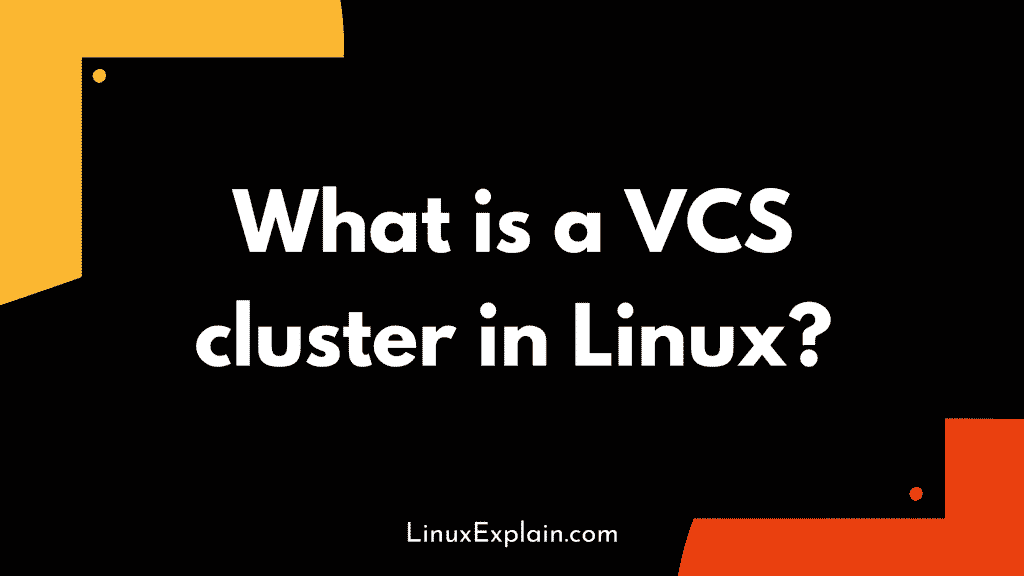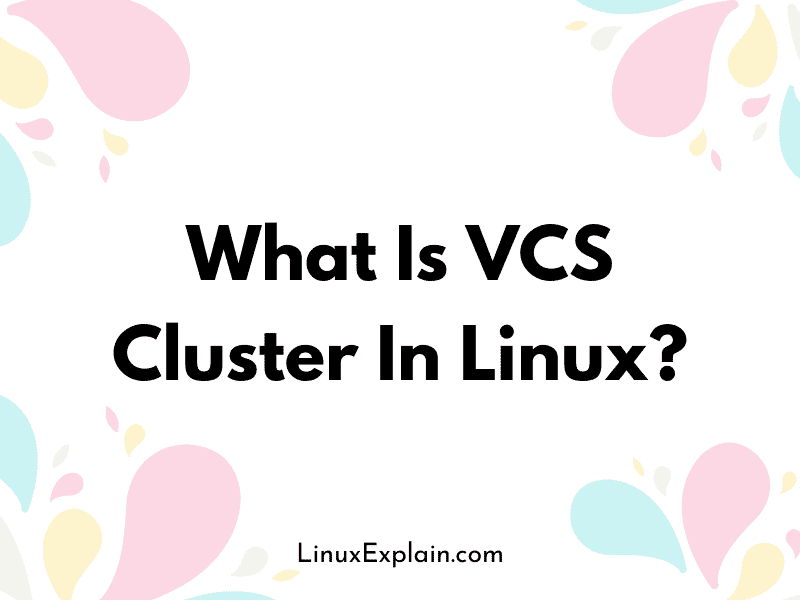A VCS cluster is a group of Linux servers that are configured to work together as a single file system and repository. This allows you to share files among the servers. And make changes to the files being worked on in a coordinated way.
What is a VCS cluster in Linux?

A VCS cluster in Linux is a group of computers that are configured to work together. This allows the computer to have a single source control server. This means that the computers in the cluster can share files and project settings. Also allows projects to be managed more easily and faster.
What does VCS mean?
VCS means Veritas Cluster Server. It’s a type of configuration used in enterprise computing environments that manages multiple servers like a single system.
How does the VCS cluster work?
The Virtual Clone System (VCS) cluster provides high availability for Git repositories. Each node in the cluster stores a copy of the repository. And the nodes communicate with each other to share changes and updates.
What are the benefits of using a VCS cluster in Linux?
A VCS cluster is a group of computers that are configured to work together as a cooperative unit for storage. And Also access, and management of source code.
VCS cluster is that it allows multiple developers to work on the same project at the same time. Without having to worry about losing the changes that they make.
What software can be used to create and manage a VCS cluster in Linux?
VCS cluster is a group of servers that work together as a storage and revision control system. It provides a centralized location for collaborating on software development projects. Also, give the ability to track changes and revert them if necessary.
Some of the most popular VCS systems include Git, Mercurial, Bitbucket, and Codeanywhere.
Is it necessary to have a server with a large storage capacity to run a VCS cluster in Linux?
A VCS cluster is a group of computers that work together to keep track of changes to a project. A server with a large storage capacity is necessary for the VCS cluster to function.
What is a cluster node?
A cluster node is a server that participates in a VCS cluster. A cluster typically contains one or more nodes that are configured to synchronize changes between each other.
Is cluster configuration hard to set up?
VCS cluster (Version Control System) is a configuration in Linux that allows managing multiple versions of the same software.
It can be used to keep different versions of source code, documents, or any other type of files.
How do you create a VCS cluster in Linux?
In Linux, a VCS cluster is a group of nodes that are managed as a single logical unit. The nodes in the cluster can access each other’s files and folders. And they can also share resources such as storage devices and networks.
You can create a VCS cluster by using the VCs command-line tool.
Can a single server be used to host both the repositories and the working copy of a project?
A VCS cluster is a group of servers that can be used to store the repositories. This allows a single server to be used to host both the repositories and the working copy of a project.
How does a VCS cluster help with software development?
A VCS cluster is a group of servers that act as a repository for code and other software artifacts. When multiple developers are working on a project, having the code live on separate servers allows for more accurate and reliable communication. If a server goes down, the code on other servers can still be accessed.
How does a VCS cluster help with software development?
A VCS cluster is a group of computers that are working together to improve software development practices. The computers in the cluster can be used to checkout, merge, and release code versions more quickly.
Virtual Desktop Clusters (VCS) in Linux
A Virtual desktop cluster (VCS) is a type of cluster consisting of two or more physical or virtual machines. These machines can share common desktops, applications, and user data.
How to Configure two-node VCS Cluster in Linux?
The configuration of a VCS cluster will vary depending on the specific operating system and version of Git. However, a VCS cluster is a group of servers configured to work together to maintain a repository of source code. The two nodes in a VCS cluster typically act as slave nodes. Which receive codes from the master node and then commit and push these changes back to the server’s public repository.
How to check the complete status of the cluster?
A cluster is an operating system that enables high availability and fault tolerance for data storage, sharing, and processing. In a virtualized computing system cluster, nodes are also grouped into resource pools to pool. It works with CPU, memory, I/O devices, storage devices, and network adapters.
What are the requirements for using a VCS cluster in Linux?
A VCS cluster is a group of computers that work together. It helps to keep track of changes to a source code project. The computers in the cluster typically use a version control system, to keep track of the changes to the project.
How VCS can be used to manage multiple versions of software?
A VCS cluster is a group of computers working together to manage multiple versions of software. This can be useful in situations where it is necessary to keep multiple versions of the same software updated.
Or in cases where it is necessary to access different versions of the software at the same time.
What are the limitations of using a VCS cluster in Linux?
A VCS cluster is a collection of Linux machines used to manage software projects. In theory, multiple developers working on the same project can use a VCS cluster to improve collaboration and workflow.
However, using a VCS cluster has some limitations:
- The number of developers working on the project is limited by the number of nodes in the cluster.
- The software can only be changed by consensus between all the nodes in the cluster. This means that if two or more developers disagree about how to fix a bug. As a result, they may have to go their separate ways and resolve the conflict.
- Manage record changes frequently in two or more locations—one for each possible change that is being made to your project. This requires careful planning and coordination at the same time. So that you do not have to wait until all developers are present before comparing versions.
What are VCS commands?

VCS (Version Control System) commands are used to manipulate files and repositories in Version Control Systems, such as Git. They can be used for a variety of tasks. These include committing changes to the repository and retrieving revisions from the server. These also offer pushing commits or branches to other servers, and more.
What is VCS virtual?
Virtual corporate social media (VCS) is a tool that enables companies to create and manage their social profiles. It also allows them to track the performance of these platforms in terms of likes/tweets/ followers etc. VCS can be used by businesses large or small, public or private sector organizations.
The benefits of using VCS include increased brand visibility. Improved customer engagement rates through social listening capabilities. Also as well as building stronger relationships with key stakeholders such as customers and employees. Additionally, it helps businesses achieve their marketing objectives faster than traditional methods like paid advertising or SEO might allow for.
How do I set up a Linux VCS cluster with docker?
Setting up a Linux VCS cluster with docker can be a challenging task, but it is possible. There are numerous resources available online that will help you get started. The Docker Community Hub provides detailed instructions on how to set up a basic docker stack for collaboration. Additionally, there are many tutorials available on sites like YouTube and Udemy that walk you through the process step-by-step.
When setting up your cluster, make sure to choose an appropriate platform and architecture. After all, You may want to use mirroring or load balancing services. These are for distributing traffic across multiple nodes to minimize downtime caused by network issues or container failures.
Is it possible to set up a Linux VCS cluster with Ansible?
Certainly, it is possible to set up a Linux VCS cluster with Ansible. However, by using Ansible’s playbooks and modules, you can automate the deployment and management of your software applications. Additionally, this will allow you to easily track changes and deployments across multiple nodes in your cluster.
Moreover, by using Ansible Tower or Modules for Kubernetes (MOKS), you can also manage volume-based workloads. As a result, database servers or web applications use Kubernetes clusters. This makes configuring an automated distribution system much simpler than traditional methods. These include installing individual components onto separate server nodes to achieve scalability objectives.
Linux High Availability Clustering on Veritas Cluster Server
Although, Linux clustering on Veritas Cluster Server is the simplest and most cost-effective way to implement clustering. Accordingly, the clustering support in Veritas Cluster Server allows you to create virtual machines with shared storage. These can be backed up by a set of VCS servers.
You can also use Linux high availability clustering for disaster recovery. Additionally, other applications require high availability and protection against failure.
What is jeopardy membership in VCs clusters?
In Linux, a VCS cluster refers to a group of computer systems that are configured and operated as a single system for managing source code. This type of cluster is used for software development tasks such as version control, testing, and collaboration between developers.
A jeopardy membership in VCs clusters refers to the privileges that users have when working in a VCs cluster. These privileges include read/write access to all files within the cluster, as well as the ability to commit changes and merge changes with others.
What are GAB, LLT, and HAD, and what are their functionalities?
VCS cluster in Linux stands for Linux Lightweight Technologies. It is a new open-source project that is based on the GAB, LLT, and HAD (Hardware Abstraction Layer) which are all related to Linux kernel technologies. In simple words, VCS Cluster will be used as a base for developing the next generation of components that can be added in the form of patches to current kernels from upstream projects.

